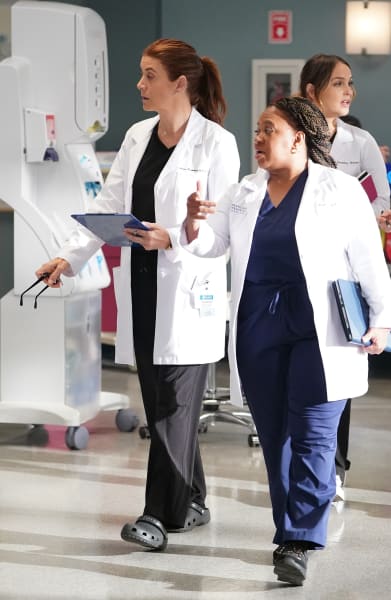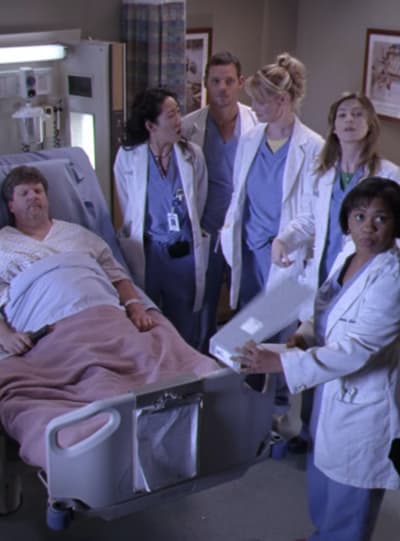Has Grey’s Anatomy Become Too Reliant on Formula?

A new era is dawning at Grey Sloan Memorial Hospital. Or is it a rehash of an earlier era?
As of the close of Grey’s Anatomy Season 20 Episode 1, Bailey is the new head of the internship program. Again.
Yes, Bailey is a true icon, and great cheers erupted across the internet when she began her famous opening line – “I have five rules.”
While all long-time Grey’s viewers love an excellent callback, are the writers relying on nostalgia and semi-recycled storylines to maintain that level of success?
And if they are, is that a bad thing?
We’ve seen several intern classes over the years, and to be honest, a lot of them are forgettable. This is the first class where the writers attempt to recapture the magic or, in this case, M.A.G.Y.K.
Yes, the original MAGIC used first names, and this one uses last names, so while this may be a return to form, the next intern class (should there be one) would have to use new initials. Let’s call this one nostalgia, not formula.
Lucas Adams is a bit of an unfortunate puppy dog, not unlike George O’Malley and also not unlike Levi Schmitt. They started off a bit bumbling and incompetent but then grew into confident surgeons who care about their patients.
Yes, there are a lot of interns who start out pretty awful and then turn out great, but the evolution of George, Schmitt, and Adams tracks.
Maturity helps, too. We have seen some remarkable transformations. Bailey was the “Nazi,” and now she’s struggling with how strict to be with the new interns. Mark Sloan and Alex Karev were both douchebags who grew into two of the most loved characters.
The best evolution award goes to Addison Montgomery, who has no equal.
She was the queen bitch when she first appeared on the scene, but over time, we have seen her pain more clearly than any other character on the show.
Her uterine transplant patient who lost her baby, the pregnant woman who bled out in the back of the van, and her sadness over Derek’s death when she returned to Grey Sloan for the first time on Grey’s Anatomy Season 18 Episode 3.
Episodes where she recurs are some of the best each season, without a doubt.
Sometimes, the writers mix it up, depart from the form, and have characters evolve negatively. Maggie Pierce is a prime example. She started a little awkward and became insufferable.
Are there any drama-free relationships in Grey’s? No, but are there drama-free relationships in reality? Probably not.
Yes, all relationships have their ups and downs, but no show puts all of their relationships through the wringer quite like Grey’s does.
Most follow a form. The couple hooks up; then they run away from each other until their feelings are realized. Drama ensues, and they acknowledge they should be together. Then, there is more drama and, finally, (maybe) happiness.
Some long-term couples like Bailey and Warren seem to have found their way there.
Some couples like Owen and Teddy are pretty toxic but can’t seem to quit each other. We’ve seen relationships end because the couple isn’t a good match (Maggie and Winston) or one person decides to quit on the other (Izzie and Alex, Jo and Alex).
Sometimes, it’s a combination of issues (Amelia and Owen, Amelia and Link) or death (Sloan and Lexie, Mer and Der).
There may be no formula for how a relationship ends, but they all start similarly.
Knowing this, Link and Jo will likely be tested a few times before they (fingers crossed) get to be happy together.
But is Grey’s a procedural? Definitely not. The cases are usually fresh and exciting. If people keep doing crazy things in real life, the writers will keep finding crazy new surgeries and traumas for our doctors.
Does each episode follow a blueprint? Definitely not. Some episodes are chock full of surgery, while others focus more on the Pit or things happening outside the hospital.
We’ve seen our share of car crashes, natural disasters, ferry accidents, etc. Have we seen a train accident yet? Or a cruise ship incident? There are plenty of far-fetched and not-so-far-fetched disasters to be mined.
Additionally, some patients live, and some patients die. Some survive surgery only to die from a complication, and some never make it out of the OR. Some never make it into the OR.
At this point, those long-time viewers, especially those who started watching almost 20 years ago (!), are enjoying the old references and callbacks.
For those who started recently, perhaps by bingeing all 19 seasons on Netflix, the parallels might be more evident as the details from earlier seasons are likely fresher and, therefore, might think of the show as more formulaic.
For those newer viewers who might have started watching in the last few years and are without the benefit of many seasons of viewing, there might be no concept of formula but also no nostalgia.
Are the Grey’s Anatomy writers relying on form? Maybe. But is it a bad thing? Probably not.
As Grey’s is pulling in impressive numbers for a series entering its third decade, fans do not seem to care if the writers rely on form.
As long as the medical cases remain exciting and creative, and the characters continue to be engaging, bring on the form!
All right, Grey’s Fanatics, where do you land on this?
Is the show getting stale or entering a new golden age? Will you keep watching?
Drop a line in the comments below.
Lucy Peel is a staff writer for TV Fanatic.
Read the original article here














